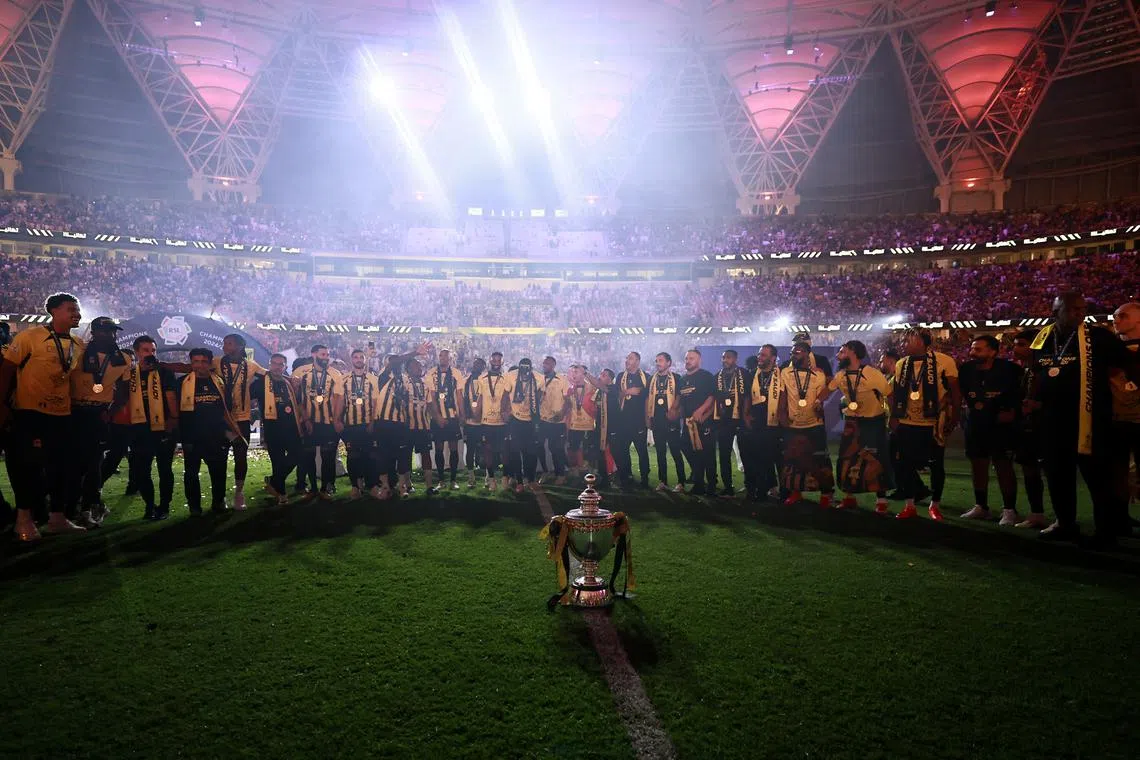New financial regulations will ensure sustainability in Saudi Pro League, says CEO
Sign up now: Get ST's newsletters delivered to your inbox

FILE PHOTO: Soccer Football - Saudi Pro League - Al Ittihad v Damac - King Abdullah Sports City, Jeddah, Saudi Arabia - May 26, 2025 Al Ittihad players celebrate with the trophy after winning the Saudi Pro League REUTERS/Stringer/File Photo
Follow topic:
RIYADH - Saudi Pro League clubs could be pumping the brakes on their free-spending ways after its CEO Omar Mugharbel said new safeguards have been put in place to make the league financially stable ahead of the new season.
SPL clubs have spent more than $1.5 billion since its 2023 boom, which included the prized capture of Cristiano Ronaldo that paved the way for players to move to Saudi Arabia on wages European clubs could not compete with.
Ronaldo has since topped Forbes' list of the world's highest-paid athletes three years in a row since his move to Al-Nassr.
But sky-rocketing transfer fees and eye-watering salary packages, which once sounded the death knell for the Chinese Super League, may be a thing of the past after new regulations were announced by the Saudi Ministry of Sport on July 1.
"A lot of what we do today is injecting better governance within the league in terms of how we operate and how we govern clubs as a whole," Mugharbel told Reuters before the new season kicked off on Thursday.
"The main objective is to raise the financial strength of the league and ensure sustainability of the league. Most recently, we launched, before the opening of the summer transfer window, our financial regulations."
Oversight of financial sustainability, previously managed by the Ministry of Sport, has been transferred to the SPL under the newly established Financial Oversight Committee in a move aimed at ensuring clubs meet all financial compliance requirements.
"That is enabling us to better govern how the clubs operate financially, but also enable them for better sustainable financial planning for the future," Mugharbel added.
"When it comes to governance, we're doing a lot of things in terms of re-looking at our regulations and how we operate and manage the game."
EMBRACING PRIVATISATION
The SPL is also shifting gears by embracing privatisation and promising to develop talent rather than simply buying it as foreign investors circle the oil-rich kingdom's soccer ambitions.
The league, whose top clubs are majority-owned by the country's Public Investment Fund, is now welcoming private ownership through a public offering, with three clubs already transferred to investment entities.
Last month marked a watershed moment when U.S.-based Harburg Group became the first foreign private company to acquire a Saudi soccer club, snapping up Al-Kholood with the promise of developing superstars instead of buying them.
"What we've seen since we've started this transformation is the influx and the interest from private entities as well in terms of investing in sponsorships," Mugharbel said.
"The revenues have been growing across the board, both from a league perspective, but also from individual clubs."
Mugharbel said the SPL is also pivoting away from the big names of yesteryear to recruiting players in their prime to create a healthy balance.
The league has implemented structural changes to boost local talent, including reducing squad sizes and mandating spots for under-21 players as part of a strategy to get more Saudi players on the pitch.
AVERAGE AGE
"Today, if we look at the average age per squad, it moved from 29 years old when we first started the transformation, now the average is 26. So this is a clear sign that we're moving towards a younger squad within the league," Mugharbel said.
"We reduced the number of spots in terms of each squad size from 30 to 25 and that happened last year.
"Obviously that enabled more players to move within the different clubs and the different divisions, giving more time for Saudi players to basically play the game."
Saudi soccer's rapid growth has seen the country top the continental confederation's club competitions rankings for the last four years and Mugharbel said the SPL is now broadcasted in more than 180 countries.
"We see a lot of interest from South America and countries like Brazil. We've also seen great results from countries in Asia," he said.
"We're focusing a lot on building, first and foremost, a competitive product for our fans in Saudi. But we also want to export the Saudi football story to the world." REUTERS

